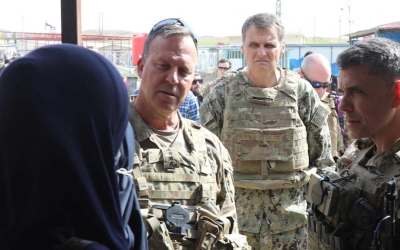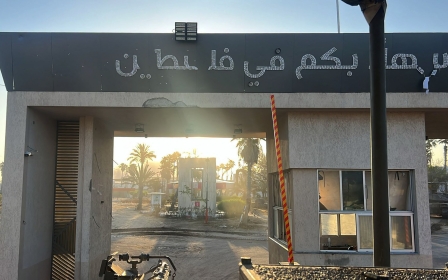Israel says its arms exports hit record sales amid war on Gaza

Israel's defence ministry said in a statement on Monday that its arms exports for 2023 hit a record in sales, as Israel's war on Gaza enters its ninth month and as the country's military continues to be supplied with hundreds of millions of dollars in American weapons.
The report by the defence ministry said that the total exports of Israeli arms reached $13.1bn in 2022, an increase of $500m from the previous year and double the amount of exports from five years ago.
More than a third of the sales comprised missiles, rockets and air-defence systems, with one of the biggest contracts of 2023 being with Germany, which signed a deal to purchase the Arrow 3 long-range air defence system for around $4bn.
"While our industries are primarily focused on providing the defence establishment with the capabilities to support our troops and defend our citizens, they are also continuing to pursue areas of cooperation and exports to international partners," Israeli Defence Minister Yoav Gallant said in a statement.
Roughly half, 48 percent, of all sales went to the Asia and Pacific region, while Europe accounted for 35 percent of sales, and North America accounted for nine percent.
New MEE newsletter: Jerusalem Dispatch
Sign up to get the latest insights and analysis on Israel-Palestine, alongside Turkey Unpacked and other MEE newsletters
The figures were released by the defence ministry as a growing number of countries have begun to boycott or suspend the purchase of weaponry from Israel, citing the country's ongoing destruction of Gaza and killing of tens of thousands of Palestinians there.
Colombia announced it would be pausing its purchases of Israeli arms, after its president, Gustavo Petro, called Israel's actions in Gaza a genocide.
In May, a French court banned Israeli companies from participating in an annual defence industry exhibition, with the country's defence ministry saying the move was likely linked to Paris' objection to an Israeli assault on Rafah, the southernmost city in Gaza where more than a million Palestinians had fled to in order to escape Israeli bombardment.
Prioritising international market despite war at home
Bloomberg reported that some of Israel's biggest weapons manufacturers were asked in the early weeks of Israel's war on Gaza to prioritise supplies to Israel's military. However, with the war still going on and there being no end in sight, these companies are focused on the international market.
"If Rafael wants to be able to provide for Israel as well as stay ahead of the game in research and development, we need international markets, which are our only assurance for real growth," Gideon Weiss, the company's vice president for international business development, said in a statement given to Bloomberg.
Israel's war on Gaza began on 7 October, when Palestinian fighters led by Hamas broke out of Gaza and launched on attack on southern Israel, killing around 1,200 people and taking around 240 people captive.
Israel responded with an immediate siege of Gaza, and launched an aerial bombardment campaign followed by a ground invasion. So far, Israel has killed more than 37,000 Palestinians, according to the Palestinian health ministry.
The US has supported Israel's war efforts, sending tens of thousands of weapons, including precise bombs and ammunition to help fill the military's supply lines. Israel currently has around $23bn worth of active military contracts with the US.
For years, the US has been Israel's largest suppliers of weapons, making up for 69 percent of Israeli arms imports between 2019 and 2023, according to the Stockholm International Peace Research Institute (Sipri).
The US also provides Israel with $3.8bn in military assistance each year.
Many of these recent arms transfers, given their size and individual cost, have also gone under the public radar, making it difficult to know the true extent of how many weapons the US has sent to Israel since October.
Middle East Eye delivers independent and unrivalled coverage and analysis of the Middle East, North Africa and beyond. To learn more about republishing this content and the associated fees, please fill out this form. More about MEE can be found here.





